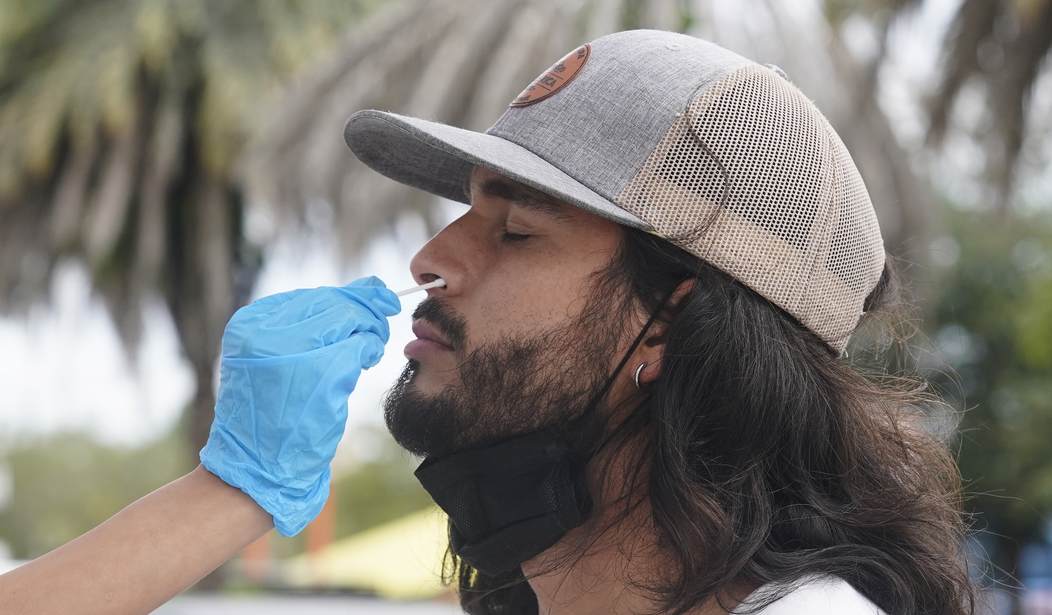I guess it’s time to start planning ahead for the fourth shot.
I’m thinking I’ll get J&J this time. That way, I’ll have the whole collection.
Then I’ll circle back to Pfizer for the fifth shot after the wave from the French variant passes and the next variant arrives from God knows where.
At the rate we’re going, that should be sometime in February.
This sounds scarier than it is, I think. *Knocks wood.*
This new mutant, called B.1.640.2, has 46 mutations in an “atypical combination,” several more mutations than omicron, which has 37, according to a preprint study that has not yet been peer-reviewed.
According to this study, the two already known spike protein mutations N501Y and E484K are also found in the new corona variant. The N501Y mutation, for example, was detected very early in the alpha variant. It causes the pathogen to bind more strongly to human cells and thus to spread more easily in the body.
E484K is one of the escape mutations located directly in the spike protein and thus probably affects the COVID vaccines’ effectiveness.
There are at least 12 documented cases so far, all of them near Marseille. They should name it “O-Macron.”
Patient zero was reportedly fully vaccinated and had traveled recently to Cameroon, where vaccination rates are abysmal. The theory is that the new variant, which has been nicknamed “IHU” for the institute that sequenced it, was circulating there and the French traveler picked it up and brought it back home with him. Time for Paris to brace for a new surge on top of the Omicron surge it’s experiencing?
Probably not. COVID testing in Cameroon is doubtless much less common than it is in richer countries but there’s nothing in the data right now pointing to a massive outbreak there:

Another key fact about IHU is that it isn’t new. It was actually identified before Omicron was. That means it had a head start in the race between each COVID variant to out-compete the others but still fell way, way, way behind Omicron.
Guys, B.1.640.2 isn’t new. It actually PREDATES Omicron. It's a sub-lineage of B.1.640- which caused some concern back in mid-November but couldn’t even compete with Delta. B.1.640.2 was first sequenced OVER a month ago and was officially recognized as a lineage in December.
— Chise 🧬🧫🦠💉 (@sailorrooscout) January 3, 2022
Virologist Tom Peacock of Imperial College in London has his eye on IHU and can’t find a reason to get worked up about a variant that’s infected a few dozen people over several months while Omicron infects a few dozen people seemingly every second.
Lots of chat about B.1.640.2 in the last few days – just a few points to keep in mind:
– B.1.640.2 actually predates Omicron
– in all that time there are exactly… 20 sequences (compared to the >120k Omis in less time)
Def not one worth worrying about too much at the mo…— Tom Peacock (@PeacockFlu) January 3, 2022
(so full disclosure on this – right after I posted this thread a new 640.2 sequence from Marseille got uploaded – fact still remains this is a total of 21 sequence over 2.5 months. The odd sequence, or even cluster, may continue to appear but zero sign currently its taking off)
— Tom Peacock (@PeacockFlu) January 4, 2022
Even the WHO is urging the media to calm down about IHU. It’s silly to worry about a strain that hasn’t proven it’s a threat when we’re in the thick of a global outbreak caused by one that has.
The World Health Organization said a coronavirus variant found in France hasn’t become much of a threat since it was first identified in November.
The variant “has been on our radar,” Abdi Mahamud, a WHO incident manager on Covid, said at a press briefing in Geneva on Tuesday. “That virus had a lot of chances to pick up.”
The variant was identified in 12 people in the southern Alps around the same time that omicron was discovered in South Africa last year. The latter mutation has since traveled the globe and kindled record levels of contagion, unlike the French one that researchers at the IHU Mediterranee Infection — helmed by scientist Didier Raoult –nicknamed IHU.
The fact that one variant has more mutations than another doesn’t mean anything in itself. As I understand it, it’s like assuming that a car that has more new parts than another necessarily runs better. It all depends on which parts are new and how efficient they are. Frankly, it’s hard to imagine how any new strain would out-compete Omicron — the fastest-spreading virus in recorded history, apparently — in terms of transmissibility. To infect a meaningful number of people at this stage of the pandemic, IHU would need to be able to puncture the immunity created by all other variants, including Omicron. Is that likely?
Note the name in the excerpt, by the way. If “Didier Raoult” rings a bell, it’s because he was the French scientist whose early study in 2020 ignited the firestorm over hydroxychloroquine, claiming that it had a 100 percent cure rate against COVID. That study was later disavowed by the journal that published it and Raoult had to face disciplinary proceedings for it.
Speaking of which, your exit question: There is a widely available drug already on pharmacy shelves that appears to be highly effective against COVID and it’s not hydroxychloroquine or ivermectin. Why aren’t more doctors prescribing fluvoxamine, the off-label treatment that actually seems to work?









